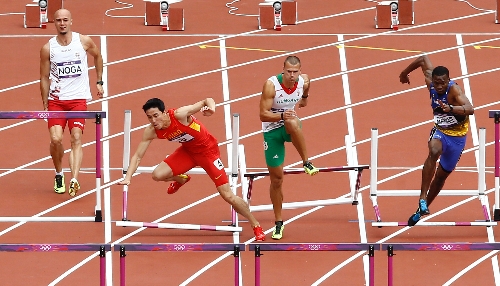China, world weep for Liu
LONDON -- Some images never fade: Her name was Wang Lei, and she stood under the larger-than-life silhouette of her hero. Her heart was broken. Her world was crashing down.
"I will forever love him," she said in 2008.
Just then, clouds moved in, and a light rain began to fall across Beijing.
Everyone, it seemed, cried for Liu Xiang that day.
Some images never fade: On Tuesday morning, Liu hopped on one foot toward the finish line of a 110-meter hurdle preliminary race he crashed out of, 80,000 in Olympic Stadium cheering his every painful movement as he labored until reaching the final hurdle and placing both hands on it.
He leaned over, spent, crestfallen, heartbroken, devastated yet again.
Balazs Baji, a Hungarian hurdler who began the race in a lane next to Liu, rushed to his side and lifted his arm into the air as if to signal a winner, a champion.
Soon, athletes from Spain and Britain also helped Liu limp off the track and into a wheelchair.
You can't create those sorts of Olympic moments in a television studio. You can't fake that kind of emotion.
"I didn't say anything because I couldn't," Baji said. "I respect him. I like him. This is the Olympics. He didn't go away."
Think of Michael Jordan in his prime. Multiply his popularity in the United States by a million. You would be entering the realm of how beloved Liu is across China.
The Olympics can be as uplifting and glorious a spectacle as athletics know, a portrait of sportsmanship and camaraderie and excellence.
They also can be just as cruel.
When he withdrew in Beijing with an injured foot in his preliminary heat, Liu was shaken and a nation mourned. Thousands departed the stadium. Fans wept in the stands and Chinese journalists in the media mix-zone. The government issued a statement of sympathy. A young woman professed her love for him while standing under a larger-than-life silhouette of Liu.
The heavens opened.
When he hobbled away Tuesday after falling over the first hurdle with an apparent blown Achilles, the immediate reaction was more shock than sadness.
It happened again.
"We've all seen how hard it is for him," Chinese team leader Feng Shu Yong said. "It is such a pity, but his spirit is here. We think that's the true spirit of the Olympics. Winning is important, but he still (was) determined to go to the end line."
It was a disastrous heat all the way around Tuesday, with three athletes unable to finish and one being disqualified. But none was more devastated than Liu, the gold medalist at Athens in 2004 who defines the hopes and dreams of China and its pursuit of athletic dominance over the world, a goal that is inching far closer to reality when you consider the medal count thus far at these Olympics.
No individual so intimately connects with a country than Liu with China. None is worshipped by 1.3 billion people.
"I want to prove to the world," Liu said before the Athens Games, "that Asians can run fast."
He did, and China never has looked back. It desires Olympic supremacy, and there is every chance it can achieve it here if it continues to deliver athletes to the podium the next several days.
China wants more than anything else to rule the sports world every four years and has the 3,000 schools dedicated to producing great athletes across its vast land to help facilitate such an objective.
Liu is a product of one such school, where athletes who range in age from 6 to 18 eat and breathe and live the sport identified through specific testing as ideal for their predicted size and talent.
Always, Liu could run.
He even posted times of less than 13 seconds this outdoor season, a first since winning gold at the World Championships in 2007.
But he is 29 and hasn't cleared a hurdle in the past two Olympics. American athletes never could comprehend the sort of pressure Liu feels to win in China, and the idea that he would be healthy and able enough to compete in Rio de Janeiro in 2016 isn't overly realistic today.
"What I saw in slow motion on the big screen, he couldn't take off," Feng said. "At the moment of taking off, the tendon couldn't bear very, very big pressure.
"In that moment, it happened."
Some images never fade.
Las Vegas Review-Journal sports columnist Ed Graney can be reached at egraney@reviewjournal.com or 702-383-4618. He can be heard from 11 a.m. to 2 p.m. Monday through Friday on "Gridlock," ESPN 1100 AM and 98.9 FM. Follow him on Twitter: @edgraney.






















